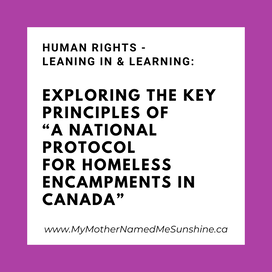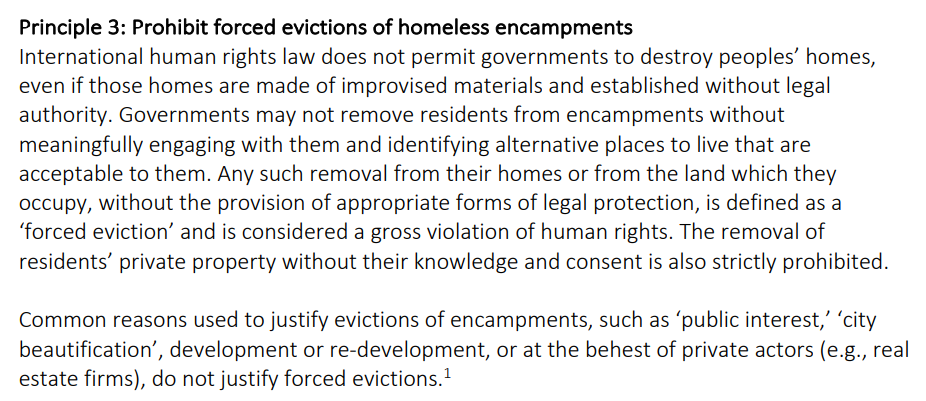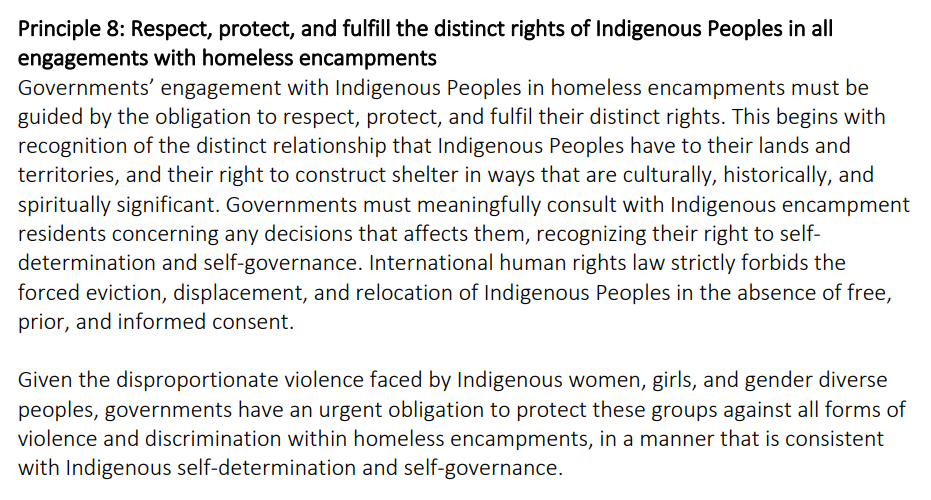|
|
Principles as identified/outlined/seen in the images/screenshots and quoted texts found within the drop downs below are all sourced from A National Protocol for Homeless Encampments in Canada PRINCIPLE 1: RECOGNIZE RESIDENTS OF HOMELESS ENCAMPMENTS AS RIGHTS HOLDERS
(Above is a screenshot from page 2)
Quoted from page 15-16 (Section 38-40): 38 All government action with respect to homeless encampments must be guided by a commitment to upholding the human rights and human dignity of their residents. For many governments and those exercising governmental authority, this will mean a shift away from criminalizing, penalizing, or obstructing encampments, to an approach rooted in rights-based participation and accountability. 39 This will mean understanding encampments as instances of both human rights violations of those who are forced to rely on them for their homes, as well as human rights claims advanced in response to violations of the right to housing. While encampments arise as a result of governments failing to effectively implement the right to housing, they can also be an expression of individuals and communities claiming their legitimate place within cities, finding homes within communities of people without housing, asserting claims to lands and territories, and refusing to be made invisible. They are a form of grassroots human rights practice critical to a democracy such as Canada’s. For Indigenous peoples, the occupation of lands and traditional territories vis-à-vis encampments may also be an assertion of land rights, claimed in conjunction with the right to housing. 40 In recognition of encampments as rights violations and rights claims, governments must rectify the policy failures that underpin the emergence of homeless encampments, while simultaneously recognizing residents as rights holders who are advancing a legitimate human rights claim. Their efforts to claim their rights to home and community must be supported, not thwarted, criminalized, or dismissed as illegitimate or gratuitous protest. PRINCIPLE 2: MEANINGFUL ENGAGEMENT AND EFFECTIVE PARTICIPATION OF ENCAMPMENT RESIDENTS
(Above screenshots are from pages 2 & 3)
Quoted from pages 16 - 18 (section 44): 44 Participation processes must comply with all human rights principles, including non-discrimination. Compliance with international human rights law requires: Provision of necessary institutional, financial, and other resources to support residents’ right to participate In order to participate in decisions that affect them, encampment residents should be provided with financial and institutional resources (e.g., wifi/internet access, meeting spaces) that support their active participation in decision-making. Such supports should include, but are not limited to: legal advice, social service supports, Indigenous cultural supports, literacy supports, translation, mobility supports, and transportation costs to attend consultations or meetings. These resources should support democratic processes within the encampment, including community meetings, the appointment of community leaders, and the sharing of information. Residents must be granted a reasonable and sufficient amount of time to consult on decisions that affect them. Provision of relevant information about the right to housing Encampment residents must be provided with information about their right to housing, including information about procedures through which they can hold governments and other actors accountable, as well as specific information about the rights of Indigenous Peoples. Provision of relevant information concerning decisions that affect residents, ensuring sufficient time to consult Encampment residents must be provided with all relevant information in order to make decisions in matters that affect them Establishment of community engagement agreement between homeless encampment residents, government actors, and other stakeholders In order to facilitate respectful, cooperative, and non-coercive communication between residents, government, and other stakeholders, government may seek to collaborate with residents to create a formal community engagement agreement (when appropriate and requested by residents). This agreement should outline when and how encampment residents will be engaged, and should be ongoing and responsive to the needs of the encampment residents. It should allow the residents of homeless encampments to play an active role in all aspects of relevant proposals and policy, from commencement to conclusion. Residents should be able to challenge any decision made by government or other actors, to propose alternatives, and to articulate their own demands and priorities. Third party mediators should be available to protect against power imbalances that may lead to breakdown in negotiations or create unfair results. Relevant government authorities and professionals should also be provided with “training in community engagement and accountability. Provision of equitable opportunities for the meaningful participation of all encampment residents As a matter of human rights law, particular efforts must be taken to ensure equitable participation by women, persons with disabilities, Indigenous Peoples, migrants, and other groups who experience discrimination or marginalization. (58) Where possible, members of these groups should be afforded central roles in the process. PRINCIPLE 3: PROHIBITION OF FORCED EVICTIONS OF ENCAMPMENTS
(Above is a screenshot from page 3)
Quoted from page 20 (section 45 - 49): 45 Under international human rights law, forced evictions constitute a gross violation of human rights and are prohibited in all circumstances, including in the context of encampments.60 46 Forced evictions are defined as “the permanent or temporary removal against their will of individuals, families and/or communities from the homes and/or land which they occupy, without the provision of, and access to, appropriate forms of legal or other protection … in conformity with the provisions of the International Covenants on Human Rights.” 47 Forced evictions are impermissible irrespective of the tenure status of those affected. This means that the forced eviction of encampments is prohibited if appropriate forms of protection are not provided – including all of the requirements described in this Protocol. It may also be considered a forced eviction when governments’ and those acting on their behalf harass, intimidate, or threaten encampment residents, causing residents to vacate the property. 48 Common reasons used to justify evictions of encampments, such as ‘public interest,’ ‘city beautification’, development or re-development, or at the behest of private actors (e.g., real estate firms), do not justify forced evictions. Evictions (as opposed to “forced evictions”) may be justified in rare circumstances, but they may only be carried out after exploring all viable alternatives with residents, in accordance with law and consistent with the right to housing, as described in this Protocol. 49 Governments must repeal any laws or policies that sanction forced evictions and must refrain from adopting any such laws, including for example anti-camping laws, move-along laws, laws prohibiting tents being erected overnight, laws prohibiting personal belongings on the street, and other laws that penalize and punish people experiencing homelessness and residing in encampments. PRINCIPLE 4: EXPLORE ALL VIABLE ALTERNATIVES TO EVICTION
(Above is a screenshot from page 3)
Quoted from pages 20-21 (sections 50 - 53) 50 Government authorities must explore all viable alternatives to eviction, in consultation with encampment residents. This means ensuring their meaningful and effective participation in discussions regarding the future of the encampment. 51 Free and independent legal advice should be made available to all residents to help them understand the options, processes, and their rights. Consultations should be conducted at times and locations that are appropriate and accessible for residents to ensure their participation is maximised. Financial and other support should be available to residents so that they can fully participate in all discussions regarding the future of the encampment and so that residents can retain outside consultants (e.g., environmental engineers, architects) where needed to assist them in developing alternative options to eviction. 52 Discussions regarding viable alternatives to eviction must include meaningfully engagement with Indigenous Peoples and be grounded in principles of selfdetermination, free, prior and informed consent. In urban contexts, for example, urban Indigenous organisations should be engaged early in the planning process to establish service delivery roles and to ensure the availability of culturally appropriate services. 53 Where personal needs differ amongst residents of encampments such that a singular best alternative is not unanimous, governments will have to develop several solutions each of which is consistent with the principles outlined in this Protocol. PRINCIPLE 5: ENSURE THAT ANY RELOCATION IS HUMAN RIGHTS COMPLIANT
(Above is a screenshot from page 3)
Quoted from pages 22-23 (section 59): 59 If, in the exceptional case there is no viable alternative to eviction by authorities, eviction must be compliant with all aspects of international human rights law. Compliance with international human rights law requires: Prohibition against the removal of residents’ private property without their knowledge and consent The removal of residents’ private property by governments and those acting on their behalf, including the police, without their knowledge and consent, in strictly prohibited. Such actions are contrary to the rights of residents and may contribute to the deepening of residents’ marginalization, exclusion, and homelessness. Governments and police must also seek to actively prevent the removal of homeless residents’ private property by private actors or any other form of harassment. Adherence to the right to housing and other human rights standards when relocation is necessary or preferred Adequate alternative housing, with all necessary amenities (particularly water, sanitation and electricity), must be in place for all residents prior to their eviction. Alternative housing arrangements should be in close proximity to the original place of residence and to services, community support, and livelihood. It is critical that all encampment residents be allowed to participate in decisions regarding relocation, including the timing and site of relocation. A full hearing of the residents’ concerns with the proposed relocation should be held, and alternatives explored. Relocation must not result in the continuation or exacerbation of homelessness, or require the fracturing of families or partnerships Relocation must not result in the continuation or deepening of homelessness for residents. Relocation must not require the separation of families or partners, as defined by rights-holders themselves, including chosen family and other kinship networks. Governments should engage encampments with a view to keeping the community intact, if this is desired by the residents. Governments should also ensure that relevant housing policies are supportive of the ways in which rights-holders define their own families, partnerships, communities and extended Indigenous kindship structures, and accommodate these whenever possible in public or social housing. Access to justice to ensure procedural fairness and compliance with all human rights Access to justice must be ensured at all stages of government engagement with encampment residents, not just when eviction is imminent. Access to justice and legal protection must meet international human rights law standards, including the provision of due process, access to legal aid, access to fair and impartial legal advice, and the ability to file complaints in a relevant forums (including Indigenous forums) that are geographically proximate. PRINCIPLE 6: ENSURE ENCAMPMENTS MEET BASIC NEEDS OF RESIDENTS CONSISTENT WITH HUMAN RIGHTS
(Above are screenshots from pages 3 & 4)
Quoted from pages 25 -27 (section 61): 61 Canadian governments must ensure, at a minimum, that rudimentary adequacy standards are ensured in homeless encampments on an urgent and priority basis, while adequate housing options are negotiated and secured. Government’s compliance with international human rights law requires:
PRINCIPLE 7: ENSURE HUMAN RIGHTS-BASED GOALS AND OUTCOMES, AND THE PRESERVATION OF DIGNITY FOR ENCAMPMENT RESIDENTS
Quoted from pages 27 - 28 (sections 63 - 65) 63 As a matter of international human rights law, the rights and dignity of residents must be at the heart of all government engagement with homeless encampments. Dignity is an inherent human rights value that is reflected in the Universal Declaration of Human Rights. As such, Canadian governments have an obligation to bring about positive human rights outcomes in all of their activities and decisions concerning homeless encampments. 64 Where Canadian governments at any level make decisions with regards to encampments, it is essential that they do so taking into account the full spectrum of human rights of residents and ensure that their enjoyment of those rights is enhanced by all decisions. Any decision that does not lead to the furthering of human rights, fails to ensure their dignity, or represents a backwards step in terms of their enjoyment of human rights, is contrary to human rights law. 65 More broadly, the Canadian government has an obligation to the progressive realization of the right to housing, alongside all other human rights. A central component of that obligation is to address on an urgent basis the needs of those in the greatest need. This means that Canadian governments must move, as a matter of priority, towards the full enjoyment of the right to housing for encampment residents. When governments fail to bring about positive human rights outcomes for encampment residents, they fail their obligation to progressively realize the right to housing. PRINCIPLE 8: RESPECT, PROTECT, AND FULFILL THE DISTINCT RIGHTS OF INDIGENOUS PEOPLES IN ALL ENGAGEMENTS WITH ENCAMPMENTS
(Above screenshot sourced from page 4)
Quoted from pages 29 - 41 (section 69): 69 Compliance with international human rights law requires:
|
|
Related Information & Resources
|
More soon!
|










